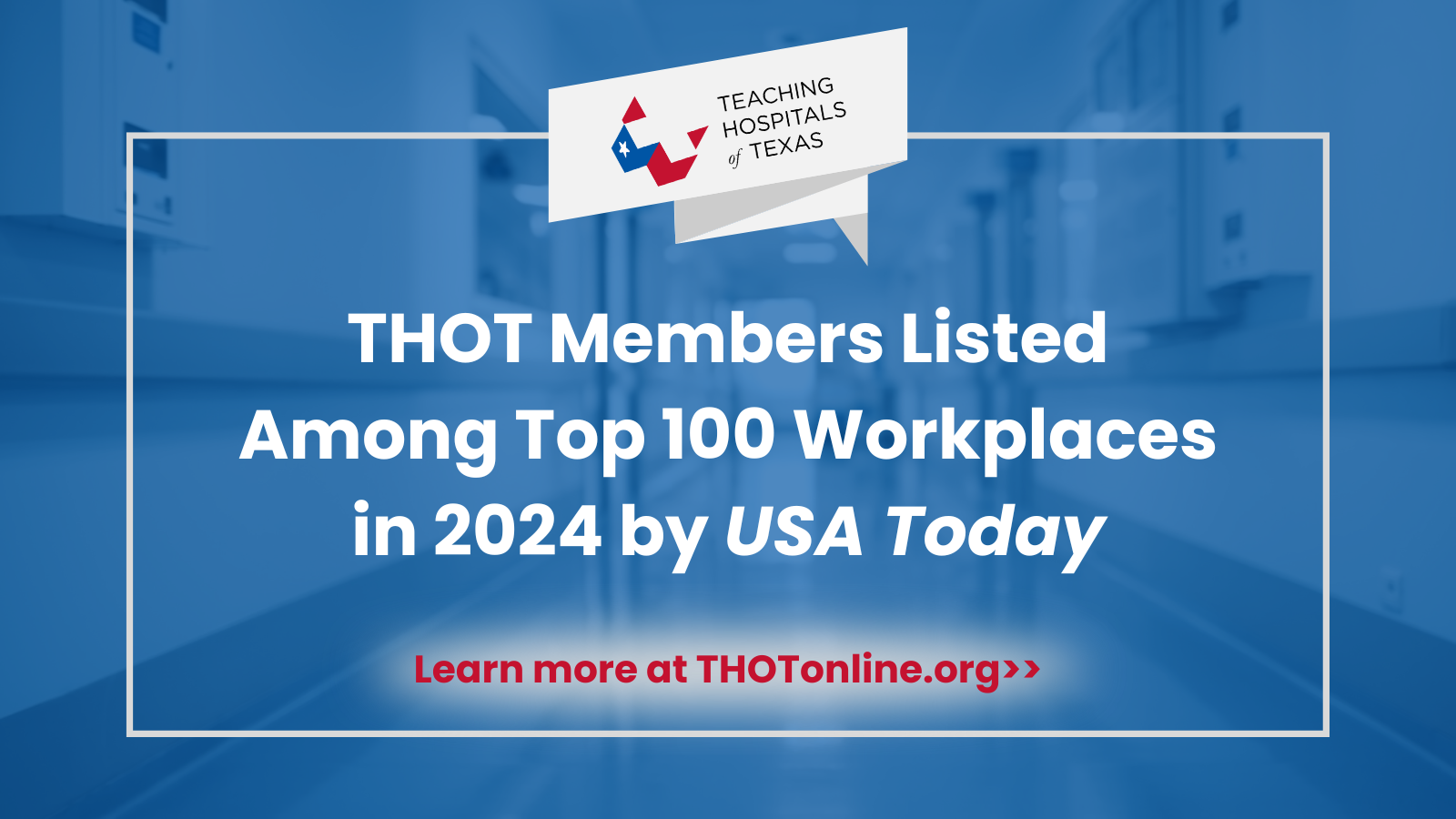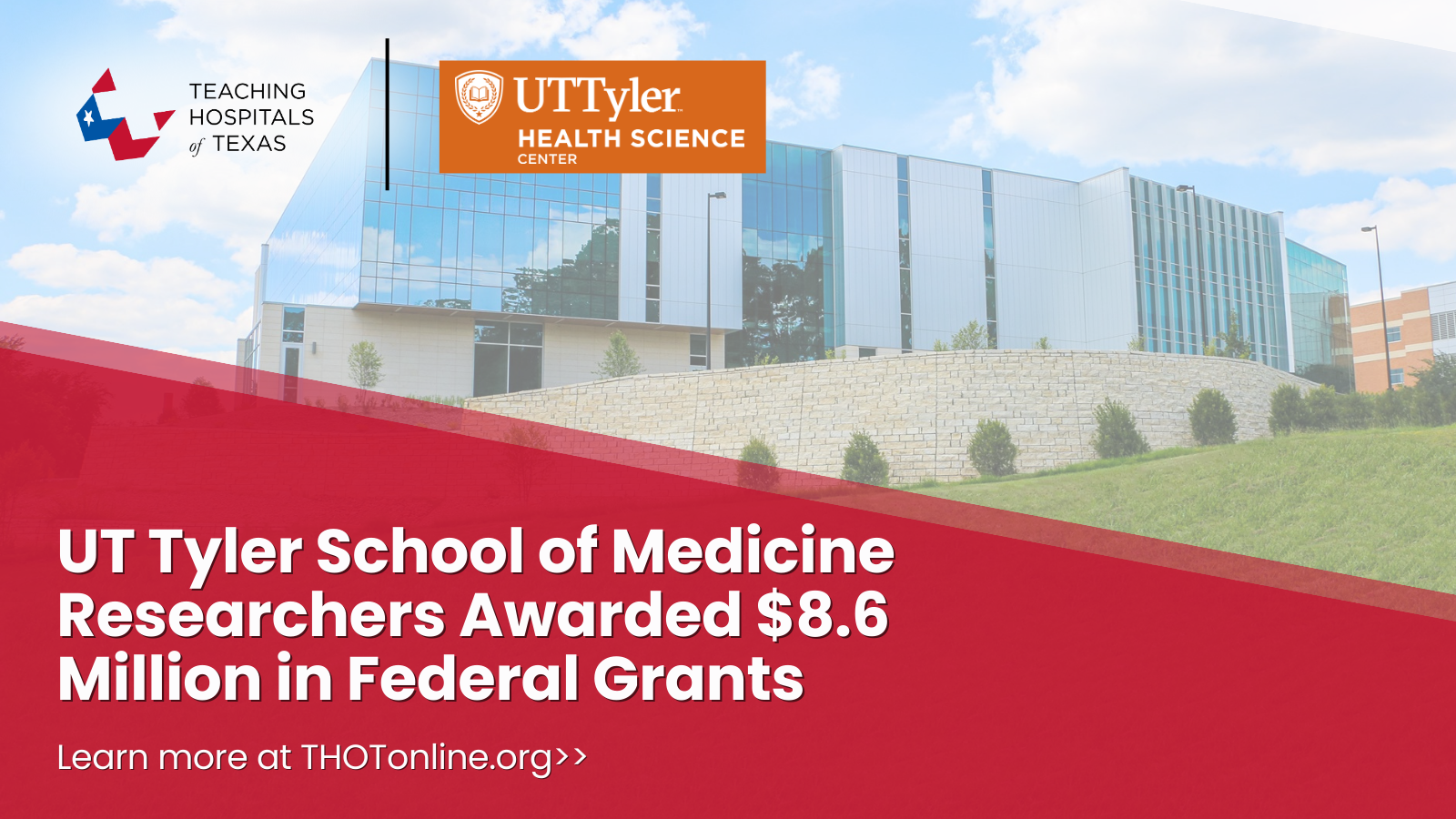From clinical trials and identifying new cancer treatments to AI and robotics, teaching hospitals are at the forefront of biomedical research and development and original research to inform policy development.
Researchers working at The University of Texas at Tyler School of Medicine were awarded a combined $8.6 million in highly competitive research grants from the National Institutes of Health. The grants will support research on:
- Treatments for heart disease, one of which includes utilizing nanotechnology to improve the longevity of heart stents.
- Viruses like HIV and COVID-19 with the goal being the development of future vaccines and helping vaccines target viruses more effectively.
- Treatment options for pleural fibrosis, a serious lung disease that can require a lung transplant to treat.
- Treating mycobacterium avium complex, the most common nontuberculous mycobacterial lung disease in the United States and one that can lead to serious lung damage.
University Health was one of the world’s largest clinical trial sites for remdesivir early in the COVID-19 pandemic. The clinical trials were sponsored by the National Institute of Allergy and Infectious Diseases. The UH site helped ensure a more ethnically diverse mix of patients in the overall study. In the first two phases, more than 85% of the patients at University Hospital were from vulnerable populations, particularly Hispanics who are often underrepresented in clinical trials of new agents.
Scientists at The University of Texas Medical Branch developed a vaccine showing promising protection against Nipah virus, a zoonotic virus that has a mortality rate as high as 70 percent and that is considered to be a pathogen of pandemic potential. The study was published in Proceedings of the National Academy of Sciences.
The University of Texas Medical Branch drug discovery partnership with Novartis received a $56 million grant from the National Institute of Allergy and Infectious Diseases (NIAID) and is one of nine such grants awarded by NIAID to establish Antiviral Drug Discovery (AViDD) Centers for Pathogens of Pandemic Concern. The partnership, dubbed the UTMB-Novartis Alliance for Pandemic Preparedness (UNAPP), will focus on coronaviruses, flavivirus and henipavirus, three major classes of viruses with pandemic potential.
The University of Texas MD Anderson Cancer Center and the Rare Cancer Research Foundation are collaborating to accelerate the development of new treatments for rare cancers by empowering all patients in the U.S. to contribute tumor samples directly to MD Anderson for translational research efforts. This initiative is designed to overcome a major obstacle that has long prevented significant progress in rare cancer research — the lack of available samples. The Rare Cancer Research Foundation will use its Pattern.org online engagement platform to enable patients to donate tumor biopsies and surgical samples for research purposes.
Researchers with Parkland Health and University of Texas Southwestern Medical Center conducted a retrospective cohort study of pregnant women delivering at 24 weeks or later to demonstrate that women without prenatal care are at significantly increased risk for adverse pregnancy outcomes and that women without prenatal care reside in areas with much higher demand for public transportation. The original research was published in the September 2021 American Journal of Obstetrics & Gynecology.
Click on the links below to read more about the many facets of Texas’ teaching hospitals.
- Community Anchors. National Leaders.
- World-Class Care for All
- Foundation of a Healthy Texas
- Training Texas’ Health Care Workforce
- Leading Care Innovation
- Care in our Communities
- Investing in the Health Care System for all Texans
Teaching Hospitals of Texas
Teaching Hospitals of Texas is the state’s principal voice and advocate for hospitals and health systems that teach, train, and mentor the next generation of physicians, nurses, and other health care professionals and are united in their commitment to supporting policies and funding to ensure healthcare access for all Texans.
Latest Topics
THOT Members Listed Among Top 100 Workplaces in 2024 by USA Today
THOT members Children’s Health and University Health were listed as top 100 [...]
UT Tyler School of Medicine Researchers Awarded $8.6 Million in Federal Grants
Four researchers working at the University of Texas at Tyler School [...]
COVID-19 Heroes and Memorial Day
Join Teaching Hospitals of Texas as we commemorate the first COVID-19 Heroes [...]



